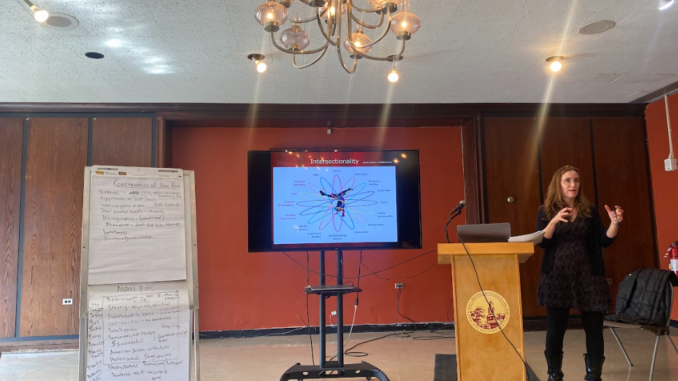
By Giovanni Ravalli
In collaboration with the Black and Latino Male Initiative (BLMI), the LGBTQ+ Resource Center hosted a storytelling workshop to learn about “positive, affirming, and alternate masculinities” on Tuesday, March 19.
The interactive workshop was presented by Dr. Jocelyn Lehrer of “The Men’s Story Project,” an innovative storytelling and community dialogue program that brings critical exploration of social ideas about masculinity into public forums via men’s personal true stories. Established in 2008 by Dr. Lehrer, The Men’s Story Project aims to break down toxic ideals and societal standards of masculinity. The project has included collaborations with multiple universities, non-profits, and United Nations Women, and has taken place in Canada, Chile, and in Gaza. Attendees learned about the many versions of masculinity while comparing them to societal expectations.
“The study of men and masculinity is a field, a growing interdisciplinary,” Lehrer said. “I’ve been both an activist and a researcher for a long time […] Back in 2008, there was very little by way of public dialogue on masculinities, and so I started ‘The Men’s Story Project’ to highlight the voices and stories of men that are less often heard.”
Attendees at the event participated in the “Man Box” exercise wherein they decided what constitutes a “good man.” Attendees included traits such as accountability, respectfulness, humility, and emotional intelligence. This is in stark contrast to how the same participants felt about society’s expectations of men at large: they’re supposed to be strong, financially successful, aggressive, and dominant–especially over women. This results in a society where men feel constrained by conflicting societal expectations and heteronormative undertones being embedded into the culture, which includes sexual identity and gender identity outside of masculinity being harassed.
“I’ve worked in a rape crisis center. I was a volunteer for many years co-facilitating an HIV support group mostly with young gay men and trans women,” Lehrer said.“And so when you work in these kinds of spaces, it just became very evident that we need to address social ideas about masculinity because they have such a big impact on such a wide range of health and justice issues for people of all genders.”
Gender norms affect everyone’s well-being, according to organizers. These norms impose a wide range of expectations of men, from bodily aesthetics to demeanor. More often than not, the unrealistic standards placed on men affect their mental health causing shame, self-hatred, depression, and anxiety. According to the Anxiety & Depression Association of America, nearly one in 10 men experience some form of depression or anxiety but less than half seek treatment, leading to their mental health conditions being underdiagnosed.
The consequences of not conforming to society’s “Man Box” only serve to harm men further according to the speakers, who defined it as “performing masculinity”–subscribing to societal expectations of what a man should be.
“The theoretical work on gender includes a critical examination of masculinity and how cultural norms around gender are created rather than something inherent to biological sex,” said Kelly Spivey, director of the LGBTQ+ Resource Center. “[The Men’s Story Project] work starts locally by creating storytelling platforms for men to talk about the positive and negative impacts of the cultural pressures to conform to gender stereotypes.”
Organizers at the event hoped that the workshop is just the beginning of unraveling the harmful societal expectations that are placed on men. It is through the Project and continued discussions, they emphasized, that would improve their mental health and have their voices be heard.
“The whole idea of this project is that it’d be local storytellers and presenters sharing their stories with their own community,” Lehrer said. “If somebody wants to create a new ‘Men’s Story Project’ production here at Brooklyn College, you’re welcome to reach out.”
Students interested in learning more about The Men’s Story Project can visit www.mensstoryproject.org, and students interested in learning more about the LGBTQ+ Resource Center can visit www.brooklyn.edu/lgbtq-center/ or visit their office in 219-221 Student Center.
